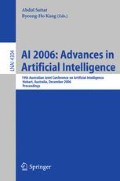Abstract
Techniques for knowledge compilation like prime implicates and binary decision diagrams (BDDs) are effective methods for improving the practical efficiency of reasoning tasks. In this paper we provide a construction for a belief contraction operator using prime implicates. We also briefly indicate how this technique can be used for belief expansion, belief revision and also iterated belief change. This simple yet novel technique has two significant features: (a) the contraction operator constructed satisfies all the AGM postulates for belief contraction; (b) when compilation has been effected only syntactic manipulation is required in order to contract the reasoner’s belief state.
Access this chapter
Tax calculation will be finalised at checkout
Purchases are for personal use only
Preview
Unable to display preview. Download preview PDF.
References
Alchourrón, C.E., Gärdenfors, P., Makinson, D.: On the logic of theory change: Partial meet contraction and revision functions. Journal of Symbolic Logic 50, 510–530 (1985)
Darwiche, A., Marquis, P.: A knowledge compilation map. Journal of Artificial Intelligence Research 17, 229–264 (2002)
Darwiche, A., Pearl, J.: The logic of iterated belief revision. Artificial Intelligence 89, 1–29 (1997)
Dixon, S.E., Wobcke, W.: The implementation of a first-order logic AGM belief revision system. In: Proc. of the Fifth IEEE Int. Conf. on Tools in Artificial Intelligence (1993)
Gärdenfors, P.: Knowledge in Flux: Modeling the Dynamics of Epistemic States. Bradford Books, MIT Press, Cambridge (1988)
Gärdenfors, P., Makinson, D.: Revisions of knowledge systems using epistemic entrenchment. In: Proceedings of the Second Conference on Theoretical Aspect of Reasoning About Knowledge, pp. 83–96 (1988)
Gärdenfors, P., Rott, H.: Belief revision. In: Gabbay, D.M., Hogger, C.J., Robinson, J.A. (eds.) Handbook of Logic in Artificial Intelligence and Logic Programming. Epistemic and Temporal Reasoning, vol. IV, pp. 35–132. Oxford University Press, Oxford (1995)
Gorogiannis, N., Ryan, M.D.: Implementation of belief change operators using BDDs. Studia Logica 70(1), 131–156 (2002)
Grove, A.: Two modellings for theory change. Journal of Philosophical Logic 17, 157–170 (1988)
Jackson, P.: Computing prime implicates incrementally. In: Proceedings of the Eleventh Conference on Automated Deduction (June 1992)
Kean, A.: A formal characterisation of a domain independent abductive reasoning system. Technical Report HKUST-CS93-4, Dept. of Computer Science, The Hong Kong University of Science and Technology (1993)
Kean, A., Tsiknis, G.: An incremental method for generating prime implicants/implicates. Journal of Symbolic Computation 9, 185–206 (1990)
Reiter, R., de Kleer, J.: Foundations of assumption-based truth maintenance systems: Preliminary report. In: Proc. of the Nat. Conf. in Artificial Intelligence, pp. 183–188 (1987)
Rott, H.: Preferential belief change using generalized epistemic entrenchment. Journal of Logic, Language and Information 1, 45–78 (1992)
Schrag, R., Crawford, J.M.: Implicates and prime implicates in random 3-SAT. Artificial Intelligence 81(1-2), 199–222 (1996)
Spohn, W.: Ordinal conditional functions: A dynamic theory of epistemic states. In: Harper, W.L., Skryms, B. (eds.) Causation in Decision, Belief Change, and Statistics, vol. II, pp. 105–134. Kluwer Academic Publishers, Dordrecht (1988)
Tison, P.: Generalization of consensus theory and application to the minimization of boolean functions. IEEE Trans. on Elec. Computers 4, 446–456 (1967)
Williams, M.-A.: Iterated theory change: A computational model. In: Proceedings of the Fourteenth International Joint Conference on Artificial Intelligence, San Francisco, pp. 1541–1550 (1995)
Author information
Authors and Affiliations
Editor information
Editors and Affiliations
Rights and permissions
Copyright information
© 2006 Springer-Verlag Berlin Heidelberg
About this paper
Cite this paper
Pagnucco, M. (2006). Knowledge Compilation for Belief Change. In: Sattar, A., Kang, Bh. (eds) AI 2006: Advances in Artificial Intelligence. AI 2006. Lecture Notes in Computer Science(), vol 4304. Springer, Berlin, Heidelberg. https://doi.org/10.1007/11941439_13
Download citation
DOI: https://doi.org/10.1007/11941439_13
Publisher Name: Springer, Berlin, Heidelberg
Print ISBN: 978-3-540-49787-5
Online ISBN: 978-3-540-49788-2
eBook Packages: Computer ScienceComputer Science (R0)

